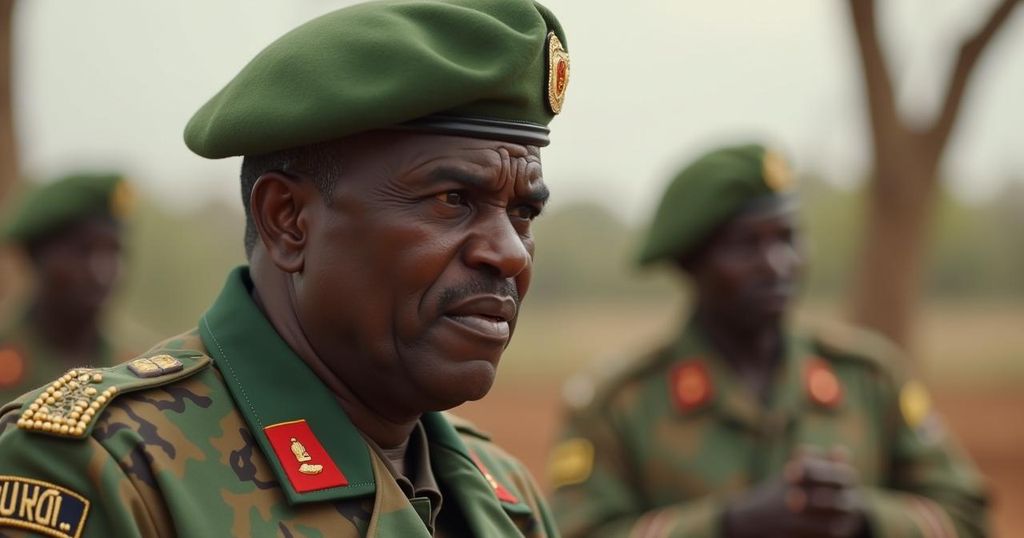Hemeti Accuses Egypt of Military Intervention in Sudan Conflict, Cairo Denies Accusations
Sudan’s Rapid Support Forces leader Hemeti has accused Egypt of conducting airstrikes against his troops, a claim denied by Cairo. Hemeti alleges that foreign powers are intervening on behalf of the Sudanese army amid ongoing conflicts that have led to a major humanitarian crisis with millions displaced. The situation remains precarious as tensions between the RSF and SAF escalate, challenging efforts for peace.
The ongoing conflict in Sudan has witnessed a significant escalation of accusations as Mohamed Hamdan Dagalo, also known as Hemeti, leader of the Rapid Support Forces (RSF), publicly accused Egypt of engaging in airstrikes against his troops near Khartoum. In a video statement, he alleged that Egyptian aircraft had executed a “treacherous attack” on his forces situated in the Jebel Moya region. Hemeti expressed frustration over what he described as Egyptian involvement in the Sudanese conflict, stating, “We have remained silent for a long time about Egyptian air involvement in the war, hoping they would withdraw, but now they have escalated.” He additionally accused Cairo of training the Sudanese army and providing drones amid the ongoing hostilities between the RSF and the Sudanese Armed Forces (SAF), which are allied with Egypt. In response, the Egyptian government promptly denied the allegations, urging the international community to seek evidence of Hemeti’s claims. The accusations come in a broader context of geopolitical tensions, as Hemeti indicated a concerning shift in power dynamics, suggesting the possibility of foreign intervention on behalf of the Sudanese army. Recent reports have highlighted Egyptian military support for the SAF, even as analysts suggested a reduction in direct Egyptian involvement due to uncertainty regarding the outcome of the conflict. In his remarks, Hemeti alleged that American-made bombs were used in attacks on his forces and claimed the involvement of various foreign mercenaries, alleging, “If the Americans were not in agreement, these bombs would not reach Sudan.” This was shortly after the U.S. sanctioned his younger brother for his role in arms procurement for the RSF. As the fighting persists in Khartoum, with the SAF making considerable territorial gains against the RSF, humanitarian concerns heighten. The conflict has displaced over 10 million people, leading to a severe humanitarian crisis, with access to basic needs increasingly jeopardized. Talks mediated by Washington have thus far failed to secure a ceasefire, underscoring the protracted nature of the fighting, with Hemeti forecasted that the war will extend for several years to come. Amid accusations of serious human rights violations, including ethnic cleansing, both combatant groups face scrutiny over their conduct in the conflict.
The conflict in Sudan, which erupted in April 2023, primarily involves the Sudanese Armed Forces (SAF) and the Rapid Support Forces (RSF). This civil strife has resulted in profound humanitarian crises, including the displacement of millions and severe food insecurity. The allegations made by Hemeti against Egypt represent a significant international dimension to the conflict, as Egypt has historically played a pivotal role in Sudanese military matters. The ongoing fighting reflects deep-rooted political tensions and power struggles within Sudan, influenced by external actors, including regional powers like Egypt and the United Arab Emirates. The mention of foreign mercenaries and international military equipment in the conflict highlights the complexities of foreign influence in Sudanese affairs and the implications for regional stability.
In summary, the current conflict in Sudan, characterized by Hemeti’s accusations against Egypt, highlights the intricate dynamics at play. The rejection of these claims by Cairo further complicates the situation, emphasizing the geopolitical interests of neighboring countries. As the situation develops, the humanitarian consequences of the conflict remain dire, necessitating urgent attention from the international community. The ongoing hostilities suggest a protracted struggle for power in Sudan, with significant implications for both the nation’s stability and regional security.
Original Source: www.middleeasteye.net




Post Comment